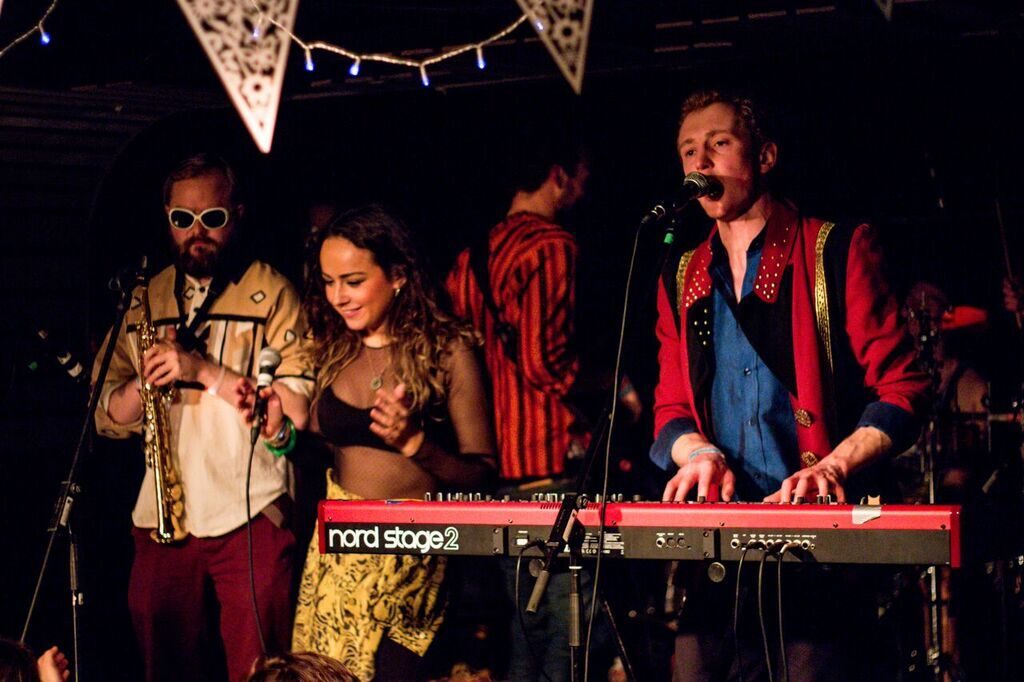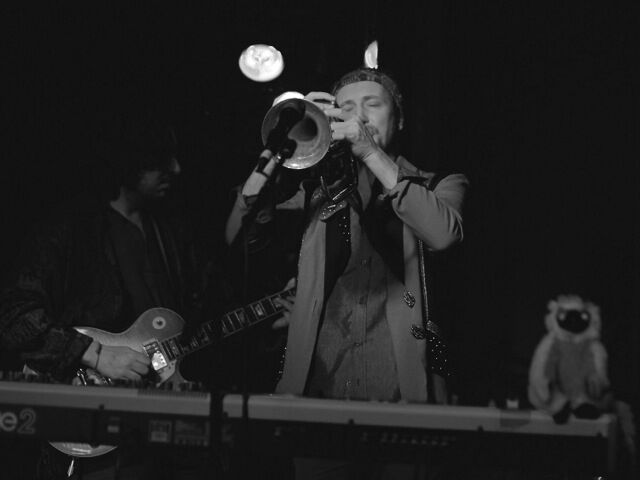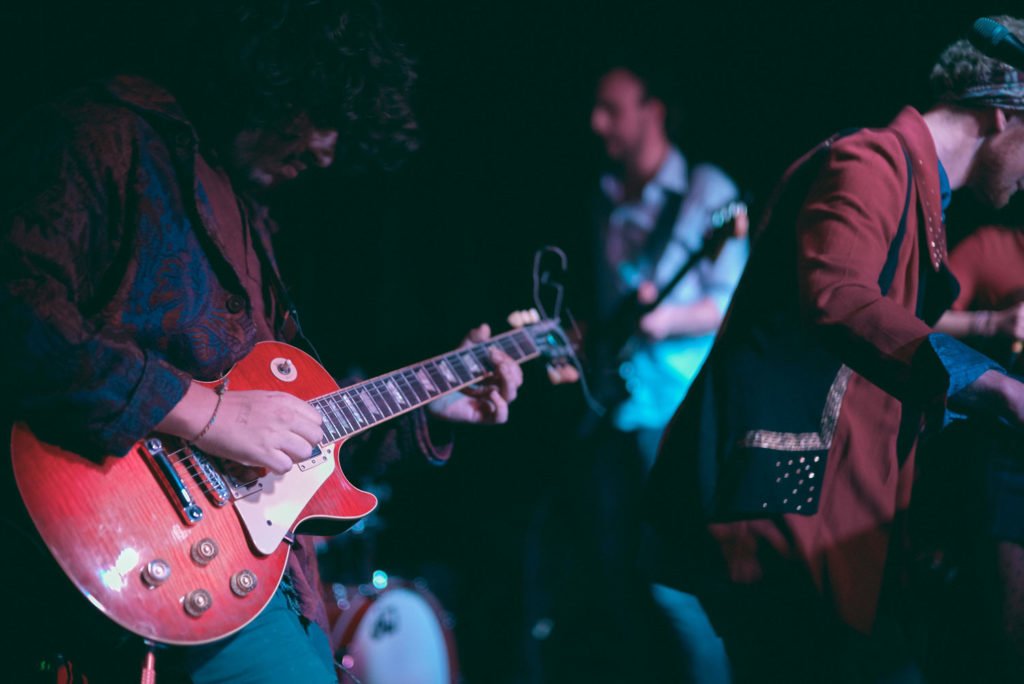SIFAKA: We want to “combine upbeat African rhythms with a powerful message of solidarity”
May 27, 2016
 Having come together gradually over the last few years, Leeds-based SIFAKA are a lively seven-piece whose music spans rock, soul, and African blues. Christy Cooney spoke to the band ahead of their E.P. launch at Wharf Chambers on 3rd June.
Having come together gradually over the last few years, Leeds-based SIFAKA are a lively seven-piece whose music spans rock, soul, and African blues. Christy Cooney spoke to the band ahead of their E.P. launch at Wharf Chambers on 3rd June.
Hi guys! Excited for the launch?
Yep we are really buzzing! The launch is the end result of a long process. Nearly a year ago we begun jamming out song ideas and scribbling lyrics onto the nearest piece of paper. To see these ideas grow into a fully-fledged E.P. is really beautiful! It has involved a lot of people along the way. The E.P was crowdfunded through a Kickstarter campaign, the recording and mixing of the E.P. was done by James Towler who we have worked very closely with, and the artwork was created by Leeds artist Mike Winnard. So to see all of these different people and elements come together to produce the physical E.P, which I can now hold in my hands, is very, very exciting!
There are seven of you in the band. Tell us about how your sound and the line-up came together.
Me (Danny, guitar) and Sam (keys, vocals) had been playing together acoustically for years. We played a lot of blues and folk music (Robert Johnson, Davy Graham, Grateful Dead) and also began to develop a keen interest in African music and the origins of the blues. During these years we formed a very close songwriting partnership, and gigged anywhere and everywhere.
At the same time, Ted (bass) and Mike (drums) were playing in loads of Leeds bands and in the pit at the Edinburgh Fringe. Sam and I had decided we wanted to start an electric project and had been looking for the right bass and drums players for a while, and when we jammed with Ted and Mike for the first time it just clicked, and the core of Sifaka was formed. Soon after this I was introduced to Nicky (sax) who has an incredible ear for harmony and melody and his sax lines added a whole new element to the music. The line up was nearly complete.
Then we met Alice (lead vocals) through playing at Ted’s university music recital with her. Her soulful vocals completely blew us away, and we soon realised her voice worked perfectly with the bluesy instrumental section. The most recent addition to the band is Jess (percussion) who has a strong interest in African music and the addition of her conga beats has been a pleasure to play with at the last few gigs!

Tell us about the artists that influenced your sound.
African blues has been a big influence on our music, but we are very much an English rock band influenced by that music. I guess we’re inspired by the way the Stones, Led Zeppelin, Spencer Davis Group etc, listened to loads of American Blues and did there own thing with it. We’re trying to do a similar thing with African Blues. Leeds is a very multicultural place, and you can hear a lot of different types of music if you dig for it. Over the last few years we’ve seen gigs by incredible African musicians like Bassekou Kouyate, Vieux Farke Toure, Abdullah Ibrahim, and Tinariwen. Seeing this music played live has been mesmerizing for us as a band, and particularly for myself as a guitarist. We want to combine these African blues styles with the 60’s rock we have always loved, and create our own style!
How has your songwriting developed while working on this release?
This is our first release with this line up, and we’ve been exploring our influences and finding our ‘sound’ as a band. A big part of this has been figuring out the best way to combine Alice’s soulful vocals with the driving bluesy grooves of the instrumental section. I think it is this partnership which has really come together in the E.P. Something we’ve learnt from seeing lots of African music is that uplifting music can portray a serious message. We believe that playing upbeat, danceable music can be a really forceful expression of dissent. This is the sort of vibe we have tried to get across in the song ‘The Devil’s Music’, in which upbeat African rhythms are combined with a powerful message of solidarity with the people of Mali.

Tell us about the themes explored in this release.
We believe that music has a social function over and above mere entertainment. In many African cultures for example, musicians have traditionally been more than just entertainers, but are keepers of the history, story-tellers, with an important political voice. In this E.P. the most important message is the outrage and heartbreak we’ve felt for the huge numbers of people who are stuck in refugee camps across Europe and beyond. That is the message of the song ‘England’. This song is a plea for English people and politicians to wake up to the scale of human suffering that is occurring right now, on our doorstep. Our song, ‘The Devil’s Music’, warns of the extremist threat to the people of Mali, where musicians have been threatened with death and mutilation by Islamists who seek to erase the history and culture of this amazing country.
As well as political messages, the E.P. also deals with themes that are more personal. The first track of the E.P. ‘Beggarman’ is written in the style of an old folk-tale and tells the story of a Devil or sorceress who promises to fulfil men’s deepest desires, but betrays these men and runs away with their souls!
The final track of the E.P. ‘Home’ deals with the question of what is fundamental. What do we truly have when we lose all else? Stemming from a nostalgic desire to return ‘home’, the song questions what our concept of home really is, and discovers that it can only be a part of ourselves.
What have you made of how the refugee crisis has developed over the last few months and how European governments have responded to it?
It’s deeply, deeply disturbing. In the last few months we have seen the beginning of deportations of refugees from the Greek Islands to Turkey, where there is little chance that they will be safe, let alone be able to have the opportunities which all human beings deserve. The Turkish government has been accused of denying refugees access to basic supplies, as well as shooting Syrians dead at the border. 80% of Syrian refugee children in Turkey are unable to attend school. So how European governments can in good conscience deport refugees back to Turkey is beyond me.
We have also seen the use of de-humanising language by many politicians and right-wing journalists to manipulate public opinion and create a sense of fear and hostility towards these people. We, the people of Europe, must unite against this terrifying trend and show politicians we will not be manipulated so easily, that we do have compassion for these people, and that we will not allow people in refugee camps across Europe to go without their basic human needs and rights.
The Sifaka E.P Launch will be at Wharf Chambers on 3rd June. Follow Sifaka at www.facebook.com/sifakamusic.

Comments